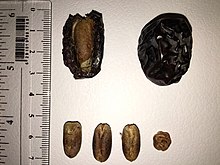You can help expand this article with text translated from
the corresponding article in Arabic. (April 2022) Click [show] for important translation instructions.
|
| Ajwa | |
|---|---|
 | |
| Genus | Phoenix |
| Species | Phoenix dactylifera |
| Origin | Medina, Saudi Arabia |
Ajwa ( Arabic: عجوه) is a cultivar of the palm date widely grown in Medina, Saudi Arabia. It is oval-shaped and medium-sized with black skin.
Ajwa plantations surround Medina and thousands of tons are exported from them annually. [1] However, it is not exclusive to Medina and is grown elsewhere on the Arabian peninsula and in the Sahara desert.[ citation needed]
It is often consumed on Iftar during the month of Ramadan and other Islamic religious events, since it has traditional associations with the Islamic prophet Muhammad. [2] [3]
Nutritional content
A commercial brand of ajwa dates (per 100 g) was reported to contain 350 calories, 82.5 g carbohydrates, 2.5 g protein, and 0 g fat, along with 20 g sugars, 7.5 g fiber, 50 mg calcium, 1 mg iron, 875 mg potassium, 0 mg sodium, and 0 mg cholesterol. [4]
References
- ^ Mohammed, Yusuf (2017-04-07). "Saudi dates exports up 37%". Arab News. Retrieved 2022-04-03.
- ^ Al-Khayri, Jameel M.; Jain, Shri Mohan; Johnson, Dennis V., eds. (2015). Date Palm Genetic Resources and Utilization. Vol. 2. Dordrecht: Springer Netherlands. doi: 10.1007/978-94-017-9707-8. ISBN 978-94-017-9706-1. S2CID 41024508.
- ^ Al-Khayri, Jameel M.; Jain, Shri Mohan; Johnson, Dennis V., eds. (2015). Date Palm Genetic Resources and Utilization. Vol. 1. Dordrecht: Springer Netherlands. doi: 10.1007/978-94-017-9694-1. ISBN 978-94-017-9693-4. S2CID 40086887.
- ^ "Ajwa Al Medina dates per 250 grams (Dry Fruit Legacy Lab Test Report)". FSSAI 2023 For Dates (Cl.2.3.47.(4). 6 September 2023. Retrieved 2 March 2024.
You can help expand this article with text translated from
the corresponding article in Arabic. (April 2022) Click [show] for important translation instructions.
|
| Ajwa | |
|---|---|
 | |
| Genus | Phoenix |
| Species | Phoenix dactylifera |
| Origin | Medina, Saudi Arabia |
Ajwa ( Arabic: عجوه) is a cultivar of the palm date widely grown in Medina, Saudi Arabia. It is oval-shaped and medium-sized with black skin.
Ajwa plantations surround Medina and thousands of tons are exported from them annually. [1] However, it is not exclusive to Medina and is grown elsewhere on the Arabian peninsula and in the Sahara desert.[ citation needed]
It is often consumed on Iftar during the month of Ramadan and other Islamic religious events, since it has traditional associations with the Islamic prophet Muhammad. [2] [3]
Nutritional content
A commercial brand of ajwa dates (per 100 g) was reported to contain 350 calories, 82.5 g carbohydrates, 2.5 g protein, and 0 g fat, along with 20 g sugars, 7.5 g fiber, 50 mg calcium, 1 mg iron, 875 mg potassium, 0 mg sodium, and 0 mg cholesterol. [4]
References
- ^ Mohammed, Yusuf (2017-04-07). "Saudi dates exports up 37%". Arab News. Retrieved 2022-04-03.
- ^ Al-Khayri, Jameel M.; Jain, Shri Mohan; Johnson, Dennis V., eds. (2015). Date Palm Genetic Resources and Utilization. Vol. 2. Dordrecht: Springer Netherlands. doi: 10.1007/978-94-017-9707-8. ISBN 978-94-017-9706-1. S2CID 41024508.
- ^ Al-Khayri, Jameel M.; Jain, Shri Mohan; Johnson, Dennis V., eds. (2015). Date Palm Genetic Resources and Utilization. Vol. 1. Dordrecht: Springer Netherlands. doi: 10.1007/978-94-017-9694-1. ISBN 978-94-017-9693-4. S2CID 40086887.
- ^ "Ajwa Al Medina dates per 250 grams (Dry Fruit Legacy Lab Test Report)". FSSAI 2023 For Dates (Cl.2.3.47.(4). 6 September 2023. Retrieved 2 March 2024.
